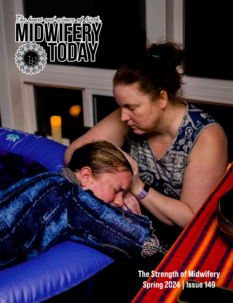
Middle Class Beliefs
Editor’s note: This article first appeared in Midwifery Today, Issue 47, Autumn 1998.
Subscribe to Midwifery Today Magazine
The problem with defining a normal birth is as difficult as trying to define the individual in group terms. In looking at white, middle class women, the problem isn’t so much what normal birth is, but why this particular group of women doesn’t question what it is more carefully.
Statistically, it is this group of women that seeks the most intervention, receives the most technological assistance, wants the most tests, and perhaps place the highest demands upon their healthcare workers, most often doctors.
If a normal birth is defined by few if no interventions, trust in natural processes rather than induced ones, and trust in the woman not the technology, the question becomes why this group, amongst all other groups, would seek procedures almost guaranteed to create a non-normal birth.
I have concluded that the two primary causes which make women deviate from normal are fear and social pressure, and the two are inseparable.
The common belief is that women seek certain kinds of medical care because they want the best for their baby, and they do so in a context of what makes them feel safe. The kind of birth they choose matches their beliefs about how safety is defined.
Within a white, middle class context, safety is defined by money, and the privilege and status money provides. These women must live by the rules of middle class society so that they can maintain both the protection and power this status offers.
They live in a culture that says submission is best. Women are taught to give up all else to make enough money, maintain appropriate social standing and appearances, and uphold defined responses to authorities and the social institutions they create. They typically follow the advice of husbands, doctors, popular magazines and other authorities rather than their own wisdom, in order to behave appropriately to their standing rather than make waves by inadvertently acting differently. In order to submit, they learn to sacrifice self, and they do so on the promise that they and their children will be taken care of—that they will be safe. In this safety, they can feel powerful.
In other words, their identities are dependent upon their financial structure and their ability to submit to the rules inherent to their financial standing. These women rarely challenge the system that binds them because to do so would sacrifice their sense of safety, leaving them to feel helpless and afraid.
With the assurances promised by middle class security, they aspire to buy safety from the realities and pains of life, and the fear of being alone. Being alone would mean an inability to survive because they are taught that they alone do not have the strength to do so themselves. Money becomes the means to transpire humanity and guarantee that they will always be taken care of, and thus come out on top.
So, what does this have to do with birth?
A woman cannot birth outside of who she is nor the values upon which she bases her life. White middle class women have become entrapped in trying to maintain appearances, ensuring they are always taken care of and avoiding discomfort and pain. When medicine dangles the latest machines, pain medications and promises, these women fight to be first in line.
Most women will say that they work with doctors and technology because it makes them feel safe, ensures that their baby will be okay and that any problems they assume will happen will be handled. They see medicine, like money, as a power that can stop the pain of childbirth, can stop the reality that things go wrong sometimes, and refute the knowledge that complications could happen to any of us, regardless of our financial or social standing.
And so they line up, almost dazed by their cultural sacrifices, for a normal hospital birth full of degrading and sometimes outright barbaric torture in the name of safety. They submit to what authorities say will guarantee safety, and sit around in mothers groups recounting their birth experiences as though they have passed some rite of passage in which mutilation is part of the practice, and never ask if another way is possible.
I realize that many practices have changed in recent years—birth centers have arisen across the country and doctors have abandoned some of their more obvious degradations. Their values remain, however, and middle class living has hypnotized women into relying on them.
The system still doesn’t believe women can birth babies. And women accustomed to living a life in which they depend upon money, husbands and social standing rather than their own strengths and beliefs find this synchronistic to the way they live the rest of their days. They don’t believe they can birth their babies either.
The system still believes pain is bad and that modernization, which must be purchased, means the elimination of pain. As a result of this belief, pain becomes a haunting ghost to be feared, never a reality to be faced.
The natural way of birth includes pain and discomfort. Modern women are often denied the psychological, spiritual and even physical privilege of facing that reality directly—working through it, and allowing their strength in facing it to be the rite of passage rather than the mutilations that accompany all the efforts made to avoid it.
The system believes that the baby comes first. Women are told to expect to sacrifice for the sake of their child. This belief is nearly archetypal—good women are martyrs. Thus, women will do anything for the sake of their baby. They are praised for doing so without ever being given the opportunity to ask whether they too are part of the process, and whether their increased participation in the process might be more beneficial for their babies than their blanket submission to stereotypes.
But in this class system, they will be expected to continue to sacrifice their personal strengths for the ideal of being good mothers. Their submission of self is crucial. A mom must remain on the sidelines of her own life for the sake of her children.
Medical protocols depend upon the growth of the economic machine. When women’s lives are busy, their money and work paramount, they come into birth with the same expectations as their trips to Walmart. They want to get in and get out with what they came for. Natural birth requires preparation, emotional and physical. Birth simply doesn’t start with labor, it starts with living. But if money is the most important thing, then it will supersede how time is spent, and the entire process of birth simply can’t squeeze its way into the structure. Hospital birth becomes convenient, quick, and lacking any other preparation than a quick class on hospital procedures, breathing, and what to buy for the new nursery.
The system requires the dependency of these women and their political power and support to maintain this status quo. Without them, the power would shift and women could find they can do all sorts of things based upon strength and intimacy rather than fear and dependence. Their reliance upon medical practices would change and so would the money and power structures that support them. Women would be more able to assess all the facts more carefully and make informed choices rather than decide between the scattered and highly influenced information they receive from physicians and hospitals.
Both direct-entry and nurse-midwives would be freer to consult and lead their practices autonomously without the fear of legal ramifications, medical freeze outs and financial destruction. And they would have greater opportunities and privileges to disperse more complete information. Women could start a revolution in healthcare if the system wasn’t so invested in keeping midwives quiet, submissive to doctors and labeled as dangerous.
Fear runs rampant in our society. Financial and class systems have been designed to protect us from our fears and the realities of humanity and nature. As a result, we have winners and losers, perpetrators and victims, and rampant inequality based on race, gender and sexual preference. Those in power do what they must to stay in power. Those not in power often do what they have to, either to be aligned with those who are or to become one of them.
For middle class women, this means submitting to medicalized birth practices even when they are harmful to themselves and their children, maintaining financial status and appearances, and staying dependent upon and submissive to anyone who will guarantee and reinforce their status, all of which they translate as safety and power. Unless they see this connection, it is unlikely they will choose any option different than the current medical system.
If we are to educate women on the normal processes of birth and truly offer them choice, we must be willing to both challenge why women choose medicalized birth, and even in our non-judgmental stance of honoring women’s right to choose, challenge the underlying fears that may motivate them to such choices. It is not enough to simply argue why such and such a practice is best for their baby. We must challenge why something is better for the mother and understand her middle class logic of safety when she says medicalization is best.
For some women, change will be simply too taxing, since changing one’s birth experience would entail challenging one’s entire way of life. For others, this will be the start of personal liberation in which one finds her strength not only to birth naturally, but to challenge outmoded beliefs about safety, pain and strength. We must give each woman the opportunity and the information not just about the pros and cons of natural childbirth, but the social and personal implications as well as the inherent beliefs about such choices. We must give women the opportunity to challenge their fears, work with them and birth through them. Not only will this change each woman, it will change the political and medical climate in which they make these choices. This will inevitably be better for everyone.


















